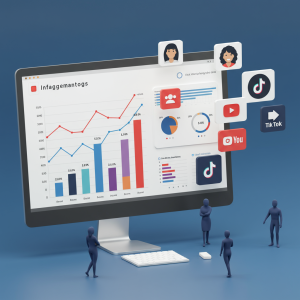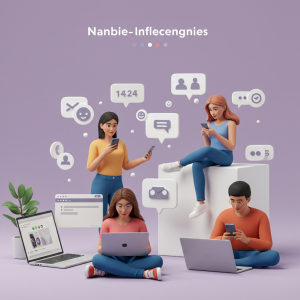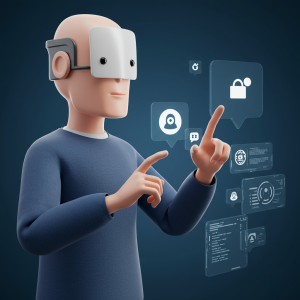How Social Media is Transforming Healthcare Marketing

The way people get hold of healthcare information and services is changing, and so are the ways healthcare providers advertise them. It is no longer just a means of posting vacation photos or staying in touch with friends, social media has become a powerful tool for healthcare marketing.
From reaching out to patients and fostering trust through educating the public, social media is reshaping how hospitals and medical institutions run themselves. This blog examines some of the astoundingly profound changes brought about in healthcare marketing by social media and tells you with examples how it has impacted upon health care companies.
The Rise of Social Media in Healthcare
Social media platforms like Facebook, Instagram, TikTok, and LinkedIn have become deeply embedded in our daily lives. With billions of active users engaging around the clock, healthcare organizations see an opportunity to use these platforms to connect more deeply with their audiences.
Why does social media matter so much in healthcare marketing?
- Wide Reach: Platforms like Facebook have 2.9 billion monthly active users. This provides healthcare marketers with access to a massive pool of potential patients.
- Two-Way Communication: Interactions on social media allow organizations to create meaningful dialogue with patients instead of one-sided announcements.
- Targeting Capabilities: Advanced algorithms make it easier to tailor content to specific demographics, such as age, location, and interests.
- Cost-Effectiveness: Marketing campaigns through social media are more cost-effective than large-scale traditional advertising efforts, making this a viable option for smaller healthcare brands.
How Social Media is Influencing Healthcare Marketing
1. Building Patient Trust and Credibility
Marketing healthcare services requires an extra layer of trust. Patients want to feel confident in their providers and treatments, and social media is increasingly a space for building this trust.
- Examples:
- Clinics and hospitals share testimonials and success stories to illustrate the quality of their care.
- Expert doctors create educational videos on platforms like YouTube or Instagram, helping demystify complex procedures or conditions.
- Dental clinics post Q&A sessions with real patient reviews to showcase transparency.
When healthcare entities share content offering real value and expertise, they’re building trust and becoming go-to sources in their respective niches.
2. Education and Awareness Campaigns
Social media has become a megaphone for public health initiatives, capable of reaching large audiences almost instantly. From promoting flu vaccinations to spreading awareness about chronic illnesses, platforms help healthcare professionals educate and mobilize communities.
- Example Campaign: The World Health Organization (WHO) frequently utilizes social media for campaigns. During the COVID-19 pandemic, WHO shared consistent updates, debunked myths, and educated people on safety measures, all via Twitter, Instagram, and TikTok.
- Micro-Targeting: Platforms allow healthcare marketers to target campaigns on a granular level. For instance, an ad campaign about pediatric vaccines could specifically reach parents of young children in a given region.
The ability to provide timely, trustworthy information has never been more critical, and social media offers the perfect distribution channel.
3. Fostering Engagement Within Communities
Social media also helps foster a strong sense of community through forums, groups, and hashtags. These elements empower patients to share experiences, resources, and encouragement while making healthcare feel relatable and accessible.
- Examples of Community Engagement:
- Twitter chats centered around disease awareness (#HeartHealth or #DiabetesCare) connect experts with patients in real-time.
- Facebook support groups for chronic illness sufferers provide a space for sharing and emotional support.
- Healthcare organizations like Cleveland Clinic or Mayo Clinic use Instagram Stories to create interactive surveys and quizzes on health awareness topics.
This community-building approach strengthens patient engagement and creates a sense of mutual support.
4. Influencer Collaborations
Healthcare is no stranger to influencer marketing. While traditionally more common in industries like beauty and fashion, collaborations now occur with health influencers working to amplify key messages.
- Influencers Bringing Awareness:
- Influencers might work with organizations to spread awareness about preventive care, like mammograms or mental health treatments.
- Fitness and wellness influencers frequently advocate healthier lifestyles, often partnering with clinics or brands aligned with their goals.
Properly vetted influencers can humanize healthcare messaging, making it more personal and accessible.
5. Enhanced Recruitment and Employer Branding
The healthcare industry heavily relies on social media to recruit healthcare professionals. With platforms like LinkedIn, companies can position themselves as attractive places to work by showcasing workplace culture, employee testimonials, and achievements.
- Recruitment Campaigns in Action:
Brands can share videos of healthcare staff explaining their roles, day-to-day operations, or career perks within the organization.
Highlighting inclusivity, stability, and growth opportunities helps employers attract top-tier talent in competitive fields like nursing or specialized medicine.
6. Driving Feedback-Driven Innovation
Social media provides healthcare organizations with live feedback on their services. Patients share candid opinions online, which, if monitored and addressed, can help drive significant improvements in marketing strategies and patient experience.
- Examples of Using Feedback for Innovation:
Hospitals create surveys on social media platforms to understand patient satisfaction better.
Online reviews reveal pain points that organizations can fix while showcasing their commitment to improvement.
7. Leveraging Real-Time Crisis Management
Utilizing social media can be a vital strategy to deal with such crisis as public health emergencies or false medical information phreaking in Sina
Hospitals, government health departments and global organizations all use social media as their tool to communicate in realtime.
As a result, trusted health care organizations now have an excellent chance to get their voice heard. This provides an opening for them as thought leaders in the digital landscape.
Tips for Using Social Media to Market Healthcare Services
Social media has shaped healthcare marketing in significant ways, but doing it effectively requires adopting some best practices for maximum impact.
Key Tips for Healthcare Marketers:
- Focus on value-driven content (think education, not just promotion).
- Stay HIPAA-compliant. Social media marketing must protect patient confidentiality at all costs.
- Create visually engaging content, including short videos and infographics explaining medical terms.
- Monitor your analytics to track what content trends resonate with your audience.
- Engage with your followers through comments and direct messages to foster interaction.
The Future of Social Media in Healthcare
Social media in the healthcare marketing still shows no sign of slowing down. At just the beginning for social platforms to turn zielorland.when AI and virtual reality take off, the potentials of these new technologies not yet have been fully explored.In the future, you might have virtual face-to-face consults via Instagram right now or an online chat with a Facebook Messenger bot for personalized health tips.
In today’s ever-changing email landscape, maintaining agility and creativity is key to riding the current trends in healthcare marketing as well as catching sight of upcoming new ones.
Harness Social Media to Build Trust and Growth
Social media is a paradigm shift nowadays. But in the medical network that change came to stay. Helped healthcare marketing.
When businesses use these platforms the right way, they can enhance confidence, bestow knowledge on communities, and gain yet even greater engagement while ensuring patients are always kept up-to-date with their health.
I am currently looking forward to the next question being how social media can help your healthcare organization flourish. Contact us, and get professional digital marketing advice which is tailored specifically for your situation!





